
Heart issue benches UT recruit
7/29/2011
Coming off a third consecutive season when everything that could have gone wrong did go wrong followed by yet another offseason of upheaval, the University of Toledo men's basketball program needed a break. Any kind of break.
Losing one of the members of its highly touted freshman class to a career-ending medical condition wasn't what anybody had in mind for the ill-fated Rockets.
Justin Moss, a 6-foot-6 power forward from Romulus (Mich.) High School who was expected to contribute immediately for UT this season, has been diagnosed with hypertrophic cardiomyopathy and his athletic career is over.
Hypertrophic cardiomyopathy is a congenital heart condition in which the heart muscle is thickened without any obvious cause, thereby making it more difficult for the heart to pump blood. It is the leading cause of sudden death in young athletes and claimed the lives of Loyola Marymount basketball star Hank Gathers, NBA player Reggie Lewis and countless other athletes.
"It is with mixed emotions that we are announcing that Justin Moss can no longer play competitive basketball," UT coach Tod Kowalczyk said Thursday. "I'm deeply saddened for Justin and his family that he has to give up his love and passion, but at the same time, I'm relieved and excited that Justin can live a happy, normal and healthy life."

Moss failed a routine physical at the end of June, and UT medical personnel had a suspicion he may have the potentially deadly heart condition known as HCM.
Moss, accompanied by UT assistant athletic director for sports medicine Brian Jones, flew to Boston to meet with Dr. Martin Maron, a leading expert in HCM who diagnosed Moss with the disease and recommended he never play competitive sports again.
"As I told Justin's mother, we can look at this as good news that our tremendous sports medicine team at the University of Toledo caught this, and Justin no longer will be put in extreme danger," Kowalczyk said. "I'd also like to thank our medical staff for their diligence and for answering all of the questions Justin and his family had on this life-threatening disease."
Moss won't be prohibited from performing everyday activities, but anything more than that could put him at significant risk. He'll also remain on scholarship at UT and be afforded the opportunity to earn his college degree.
"We left there with the message that Justin can lead a very normal, healthy life -- outside of competitive, high-intensity exercise. That was his takeaway," Jones said. "He's a great kid, and that's why I feel so bad for him. But I also feel great because we prevented something tragic."
Without Moss, the Rockets are left with just nine scholarship players for the upcoming season -- this after finishing last season with a 4-28 record.
The NCAA docked the UT men's basketball program three grants-in-aid in May for low Academic Progress Rate scores, leaving the Rockets with only 10 available scholarships for the 2011-12 season.
Because of the timing of Moss' departure, the Rockets will likely go into this season without a full roster.
"One of the best teams I had at Wisconsin-Green Bay, we won 22 games two years ago with nine scholarship guys," Kowalczyk said. "The future of the program is in great shape and we're going to be fine."
In 2006, UT center Haris Charalambous, a 21-year-old from Manchester, England suffered sudden cardiac death when his aorta ruptured during a basketball practice.